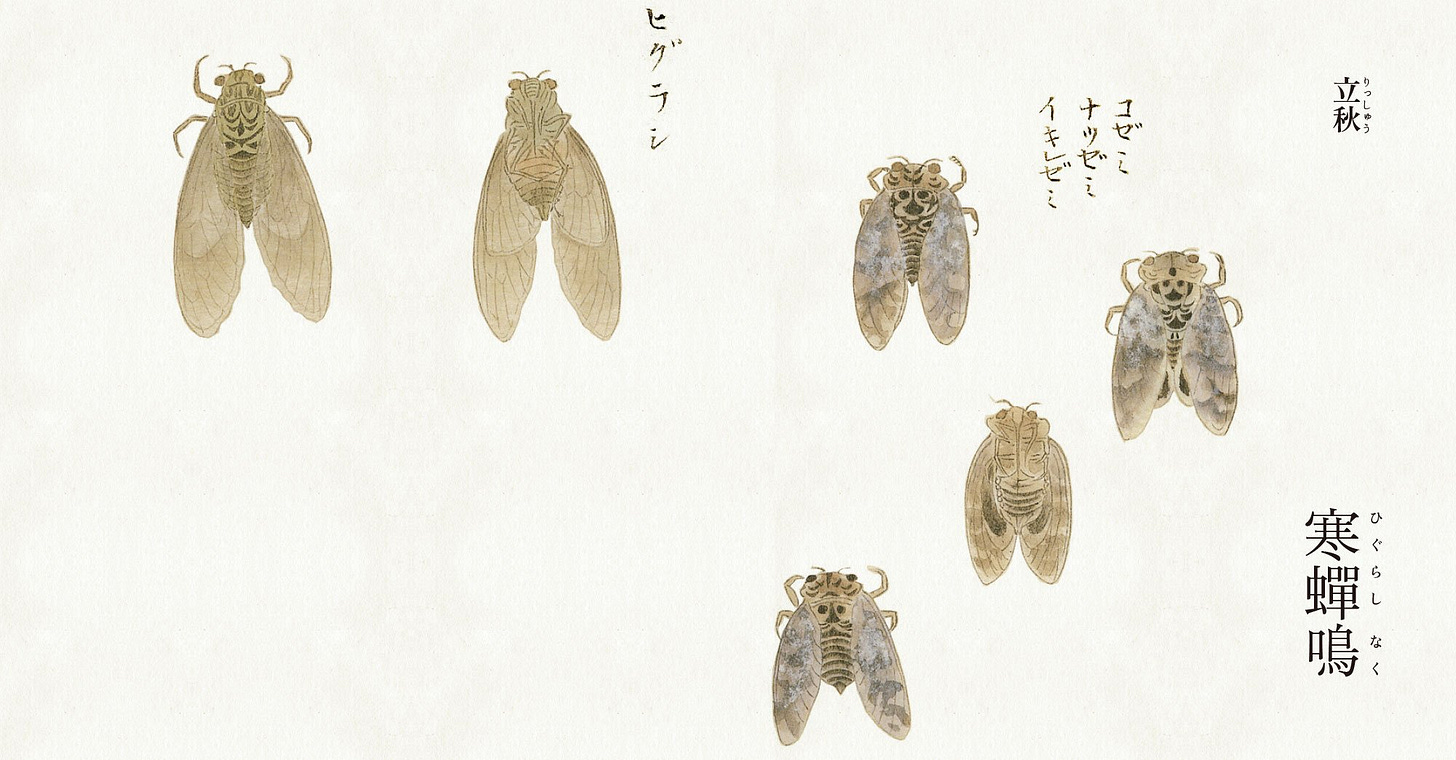August 13 - 17
寒蟬鳴
ひぐらし なく
Higurashi naku
”Evening cicadas sing”
The symphony of nature’s soundscapes perform on their own schedule and for their own reasons, but that doesn’t stop us from assigning certain moods and meanings to them. Joy, fear, and in the case of this kō’s stars: melancholy.
In the gloomy hours when dusk falls during the transitionary weeks between late summer and early autumn, a distinctive call can be heard. It signals an end to holidays and breaks from school, and the downswing of the year. Temperatures are gradually lowering, daylight hours grow shorter and shorter, plants are wilting from their peak verdant life. All these feelings and scenes are brought to mind by the call of the higurashi, the evening cicada. They sing a song of ending.
And this time of the year coincides with an observance of endings: Obon. Celebrated for over 500 years in Japan, Obon is a period where the spirits of those who have passed are welcomed back home with food and guiding lights. During this time, many people travel back to their hometown to visit living relatives, refresh household altars1 and the family grave2, and celebrate the end of summer with their community via a week of festivals. The most notable of these festivals’ events is the Bon-Odori, a group dance performed at the center of the festival square around a wooden platform called a yagura. In many areas, the dance incorporates moves representing the area’s history, forming a performance of overall remembering for what’s come and gone before.
Amidst the fun and food of the festivals, there is of course an undercurrent of melancholy to thinking about those you’ve lost—or if you’re young and as yet unacquainted with such things, thinking about another summer gone by all too quickly. So it is the sights and sounds around Obon, of which the evening cicada is one, become strongly tied to this sort of fond, nostalgic sadness.
The cry of cicadas can be heard all throughout Japanese summer, and each has their own time in the sun, so to speak. And to those who pay attention, each call is distinctive and connected to a certain spot on the calendar. Spring cicadas go “gēkyo-gēkyo” in late April, peak summer cicadas go “meen-meen” in mid-July, and evening cicadas go “kana-kana-kana”3 in early August. In shows, movies, and other popular media, each one can be used as an auditory shorthand for a time of year and the feelings it represents.
One such example is in the cult classic4 murder mystery computer game Higurashi When They Cry (ひぐらしのなく頃に), a “sound novel” which relies heavily on emotive audio to bring life to its story. A key motif is, of course, the distinctive call of the higurashi and all that emotion and cultural meaning they bring to the game’s moody, rural setting.
The best way to stave off the blues that comes with summer’s impending end is to seek out tasty food to enjoy in good company. Alongside plenty of tasty festival food to wander around with in a yukata, there’s no shortage of produce and seafood coming into season.
● Seasonal flower
hōzuki, ほおずき, lantern plant5● Seasonal seafood
megochi, めごち, big-eyed flathead● Seasonal fruit
bashō, バショウ, Japanese banana6



Although written with the character 蜩, it is said that higurashi were so-named for the word 日暮, pronounced the same and meaning “twilight” or “dusk,” the time when the eponymous insects can be heard signaling the end of another day. It’s fitting, then, that the word higurashi (日暮らし) can also mean “living day-to-day,” making it through another sunup to sundown. The call of the evening cicada, reverberating in the darkening summer sky, brings to a close another day for us and the world around. Perhaps the reason we find its song melancholy is because it reminds us that something has passed that can never be regained.
But, of course, there’s always a new day at the dawn.
See you next kō~
[Images & info by kurashikata.com, kurashi-no-hotorisya.jp, 543life.com, and Wikipedia except where otherwise noted]
These typically include a small replica shrine, a picture of those who’ve passed away, flowers, and offerings of food and drink (often ones they enjoyed in life)
Japan almost exclusively practices cremation for the deceased, and gravestones are shared by an entire family lineage in a certain area, with no bodies interred but instead talismans added for each member who has passed—being outside they of course get dirty over time, so an annual cleaning is also a good time to visit and reminisce
One could easily draw a parallel to the common haiku emphasizing phrase, which is also kana
The original computer game release, anyway—the title has since seen a dozen adaptations to anime, manga, and live action movies and shows
Also called the “winter cherry,” the ripe fruit of the lantern flower is edible and popular in traditional medicine
The famous haiku poet took his pen name from this plant







